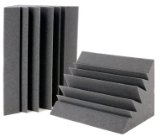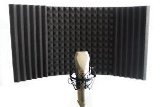Studio Soundproofing
Why use soundproofing,
What type to use.

Studio Soundproofing, What are the best acoustic panels to use for soundproofing a home recording studio?
More then likely you will be using a spare room or even a spare corner in a room for your home recording studio.
Even if you are using a room that has good acoustics, or plugging the instrument directly into the mixer or audio interface you will still need some type of soundproofing. The way the room sounds will effect how the music sounds.
Sound bounces of walls causing reflections of the sound, so you will be recording the reflections as well as the original sound. These reflections can add body and liveliness to the sound but are hard or impossible to remove when recorded.
If you record using sound isolation then the sound will not have any extra reflections added to the recording, this will be a "dead" recording, (dead is good in this case) You then have control over the sound and can add effects and dynamics as needed.
You can isolate the sound by using a sound booth, vocal booth or reflection filter. These will stop unwanted sound getting into the recording and stop the sound getting out into the rest of the house.
When you are mixing, the room will have an effect on the sound you here from the monitors. You can use acoustic panels and bass traps to help reduce the reflections.
Near-field monitors will help with this problem. You can also mix at low volumes to reduce it. Using good quality studio headphones is a good option as well.
Possible the cheapest and easiest is using a reflex filter or Auralex 2 Wedgie with studio headphones. But it depends on what you are recording.





